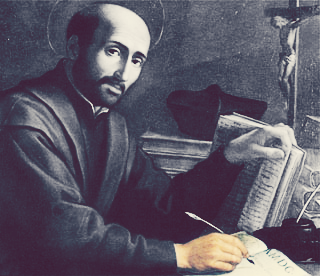 During the beginning of Saint Ignatius’ journeys, after he had laid his sword before the altar of Our Lady of Montserrat and had taken the clothes of a beggar, he made his way to a cave in Manresa for a few days of prayer and contemplation. His time there turned into ten months of prayer and work at a hospital. It was in Manresa that Ignatius formed the Spiritual Exercises, a set of meditations and guidelines for a 30-day retreat all Jesuits make, as well as many lay people and other religious orders. What began as jottings in his notebook turned into one of the most famous spiritual guides in the world.
During the beginning of Saint Ignatius’ journeys, after he had laid his sword before the altar of Our Lady of Montserrat and had taken the clothes of a beggar, he made his way to a cave in Manresa for a few days of prayer and contemplation. His time there turned into ten months of prayer and work at a hospital. It was in Manresa that Ignatius formed the Spiritual Exercises, a set of meditations and guidelines for a 30-day retreat all Jesuits make, as well as many lay people and other religious orders. What began as jottings in his notebook turned into one of the most famous spiritual guides in the world.
In Manresa Ignatius experienced profound transformation. God was like his school teacher, he often analogised. During his time there he made notes of his experience of God, the emotions and feelings he experienced as well as the fruits of his prayer. In time he discovered that God communicated to him through his feelings, his imagination, and everything around him. He noted how God would use certain feelings to guide him on the right path, while the evil spirit would use other feelings to cause him to stray away from God. All these things he wrote down, which eventually made its way into the Spiritual Exercises we know today. His teachings on things like the Discernment of Spirits, repetition, colloquy, and decision-making came out of his experience in Manresa.
Thankfully we don’t need to figure out all these things because Ignatius did it for us 500 years ago, but this doesn’t mean you can’t jot down your own experiences of God in a notebook. By making this a regular habit and reflecting back on past notes you will start to see patterns of grace and moments of God. You’ll discover how God uniquely works in your life. This becomes your own “spiritual exercises”, your own guide to how God’s spirit moves in your everyday life.
 Practical Pointers: Practical Pointers:
|
This habit will give you rich insight into how the good and evil spirits—as Ignatius calls them—affect different feelings and how different feelings tug you in different directions. It may also give you insight into what’s been on your mind (a big decision perhaps?) and if God is giving you some guidance. Once you come to see how God works and communicates with you interiorly over time, this little notebook will become your own spiritual exercises, guiding your spiritual and practical life like Saint Ignatius.
Related Resources:
Listen to an audio version of this post…
Music by Kevin MacLeod









This is a very beautiful — and helpful — post. Thank you 🙂
I had the privilege of spending six weeks in Manresa this spring on the occasion of the Ignatian Immersion Course. This was a blessed time, indeed, a gift that keeps giving. Ignatius has become very real to me as well.
What do we mean by the term ‘the evil spirit’? Is our version today the same as that of the saint?
Patricia,
The “evil spirit” can be named many things: the devil, Satan, apathy, temptation… It basically is anything that pulls you away from God. Ignatius saw this real tension between good and bad, God and not-God. It is up to us to discern which is which, and which way to let ourselves be pulled. I recommend this primer on the Discernment of Spirits: http://goo.gl/74GuKK
Peace,
Andy
Thanks Andy. By naming this evil spirit as apathy you bring it alive for me. Using bigger words such as devil or Satan or larger concepts God/not God, I find alienating. But then perhaps finding a meaningful language for oneself is a first step in discernment? Patricia
Reblogged this on Lavender Turquois.
That is really a good idea. Thank you for the suggestion. Now if only I could go hang out in a cave for ten months and pray – that would be the best! Any suggestions? 🙂
It’s even hard for someone to take a weeklong retreat! Those who wish to make the full 30-day Spiritual Exercises either have to be on sabbatical or leave their job (unless they have enough vacation time). The best thing about Ignatian spirituality is that it can be used daily!